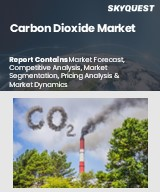
|
시장보고서
상품코드
1631443
산화 에틸렌 시장 : 세계 산업 분석, 규모, 점유율, 성장, 동향, 예측(2025-2032년)Ethylene Oxide Market: Global Industry Analysis, Size, Share, Growth, Trends, and Forecast, 2025 - 2032 |
||||||
세계의 산화 에틸렌 시장 규모는 2025년에 318억 달러에 달할 것으로 보이며, 2025-2032년의 예측 기간에 4.70%의 CAGR로 확대하며, 2032년에는 440억 달러에 달할 것으로 예측됩니다.
에틸렌옥사이드(EO)는 주로 부동액과 폴리에스테르 섬유의 원료인 에틸렌글리콜 생산에 사용되는 중요한 산업용 화학물질로, 제약, 섬유, 농업 등 다양한 분야에도 응용되고 있습니다. 에틸렌 옥사이드는 은 촉매의 존재하에 에틸렌을 산소로 직접 산화시켜 생산됩니다. 산화 에틸렌 시장은 산업 응용의 확대, 폴리에스테르 섬유 수요, 의료기기 멸균에 대한 사용 등의 영향을 받고 있습니다. 주요 촉진요인으로는 견고한 산업 수요, EO 유래 제품의 소비 확대, 생산 공정의 기술 발전 등을 들 수 있습니다.
세계 에틸렌 옥사이드 시장은 에틸렌 글리콜 생산의 필요성을 증가시키는 폴리에스테르 및 부동액 제품 수요 증가 등 여러 요인에 힘입어 성장하고 있습니다. 에틸렌 옥사이드의 살균에 대한 사용과 계면활성제 및 플라스틱 생산에서 에틸렌 옥사이드의 중요성이 증가하면서 시장 확대가 더욱 가속화되고 있습니다. 또한 특히 식품 및 음료 분야에서 포장재에 대한 수요가 증가함에 따라 EO에 대한 수요가 증가할 가능성이 높습니다. 공정 효율성 개선 및 환경적 지속가능성 향상과 같은 EO 생산의 기술적 진보도 시장 성장을 가속하고 있습니다. 또한 신흥 국가의 화학 산업 확대는 시장 진출기업에게 큰 비즈니스 기회를 제공할 것으로 예상됩니다.
에틸렌옥사이드 시장은 특히 멸균에 대한 EO의 사용 확대와 친환경 제품에 대한 수요 증가로 인해 큰 기회를 제공합니다. 특히 신흥 국가 시장에서 의료기기 멸균 증가는 에틸렌 옥사이드 시장의 주요 촉진요인입니다. 또한 에너지 효율이 높은 공정 개발 등 EO 생산 기술의 발전은 운영 비용을 절감하고 수익성을 개선할 수 있는 길을 제시하고 있습니다. 또한 지속가능성과 친환경 화학에 대한 관심이 높아짐에 따라 시장 참여자들은 기존 EO 기반 제품을 대체할 수 있는 친환경 제품을 개발할 수 있는 기회를 제공합니다.
세계의 산화 에틸렌 시장을 조사했으며, 유도체별, 최종 용도 산업별, 지역별 동향, 시장 진출기업 개요 등의 정보를 전해드립니다.
목차
제1장 개요
제2장 시장 개요
- 시장의 범위와 정의
- 시장 역학
- 유도체 수명주기 분석
- 세계의 산화 에틸렌 시장 : 밸류체인
- Porter’s Five Forces 분석
- 지정학적 긴장 : 시장에 대한 영향
- 거시경제 요인
- 예측 요인 - 관련성과 영향
- 규제와 기술의 상황
제3장 세계의 산화 에틸렌 시장 전망 : 실적(2019-2024년) 및 예측(2025-2032년)
- 주요 하이라이트
- 시장 규모(10억 달러) 분석과 예측
- 세계의 산화 에틸렌 시장 전망 : 유도체별
- 시장의 매력 분석 : 유도체별
- 세계의 산화 에틸렌 시장 전망 : 최종 용도 산업별
- 시장의 매력 분석 : 최종 용도 산업별
제4장 세계의 산화 에틸렌 시장 전망 : 지역별
- 주요 하이라이트
- 과거 시장 규모(10억 달러)와 수량(개) 분석, 2019-2024년, 지역별
- 현재 시장 규모(10억 달러)와 수량(개) 예측, 2025-2032년, 지역별
- 시장의 매력 분석 : 지역별
제5장 북미의 산화 에틸렌 시장 전망 : 실적(2019-2024년) 및 예측(2025-2032년)
제6장 유럽의 산화 에틸렌 시장 전망 : 실적(2019-2024년) 및 예측(2025-2032년)
제7장 동아시아의 산화 에틸렌 시장 전망 : 실적(2019-2024년) 및 예측(2025-2032년)
제8장 남아시아 및 오세아니아의 산화 에틸렌 시장 전망 : 실적(2019-2024년) 및 예측(2025-2032년)
제9장 라틴아메리카의 산화 에틸렌 시장 전망 : 실적(2019-2024년) 및 예측(2025-2032년)
제10장 중동 및 아프리카의 산화 에틸렌 시장 전망 : 실적(2019-2024년) 및 예측(2025-2032년)
제11장 경쟁 구도
- 시장 점유율 분석, 2024년
- 시장 구조
- 기업 개요(상세 - 개요, 재무, 전략, 최근 동향)
- BASF SE
- China Petrochemical Corporation
- Clariant
- Dow
- India Glycols Limited
- INEOS
- LOTTE Chemical Corporation
- LyondellBasell Industries Holdings B.V.
- NIPPON SHOKUBAI CO., LTD.
- Reliance Industries Limited.
제12장 부록
KSA 25.02.07Persistence Market Research has recently released a comprehensive report on the global Ethylene Oxide Market. The report offers a thorough assessment of crucial market dynamics, including drivers, trends, opportunities, and challenges, providing detailed insights into the market structure. This research publication presents exclusive data and statistics outlining the anticipated growth trajectory of the global ethylene oxide market from 2025 to 2032.
Key Insights:
- Ethylene Oxide Market Size (2025E): USD 31.8 billion
- Projected Market Value (2032F): USD 44 billion
- Global Market Growth Rate (CAGR 2025 to 2032): 4.70%
Ethylene Oxide Market - Report Scope:
Ethylene oxide (EO) is a critical industrial chemical used primarily in the production of ethylene glycol, which is used to make antifreeze and polyester fibers. EO also finds applications in various sectors, including pharmaceuticals, textiles, and agriculture. It is produced through the direct oxidation of ethylene with oxygen in the presence of a silver catalyst. The market for ethylene oxide is influenced by growing industrial applications, demand for polyester fibers, and its use in sterilizing medical equipment. Key drivers include robust industrial demand, growing consumption of EO-derived products, and technological advancements in production processes.
Market Growth Drivers:
The global ethylene oxide market is propelled by several factors, including the increasing demand for polyester and antifreeze products, which drive the need for ethylene glycol production. Ethylene oxide's use in sterilization and its growing importance in the production of surfactants and plastics further supports market expansion. Moreover, the rising need for packaging materials, particularly in the food and beverage sector, is likely to boost demand for EO. Technological advancements in EO production, including improvements in process efficiency and environmental sustainability, are also fostering market growth. Additionally, the expanding chemical industry in emerging economies is expected to provide significant opportunities for market players.
Market Restraints:
Despite promising growth, the ethylene oxide market faces challenges related to environmental concerns, health and safety issues, and fluctuating raw material prices. The production of EO involves the release of greenhouse gases, contributing to environmental degradation. Regulatory pressures aimed at reducing emissions and ensuring worker safety could potentially increase production costs. Furthermore, raw materials such as ethylene, which are closely tied to crude oil and natural gas prices, create volatility in the cost structure. These factors may restrict the market's growth, especially in regions with stringent environmental regulations.
Market Opportunities:
The ethylene oxide market presents significant opportunities, particularly in the growing applications of EO in sterilization and the increasing demand for eco-friendly products. The rise in medical device sterilization, particularly in developing regions, is a key driver for the ethylene oxide market. Furthermore, advancements in EO production technology, such as the development of more energy-efficient processes, present avenues for reducing operational costs and improving profitability. Additionally, the increasing focus on sustainability and green chemistry offers market players the opportunity to develop more environmentally friendly alternatives to traditional EO-based products.
Key Questions Answered in the Report:
- What are the primary factors driving the growth of the global ethylene oxide market?
- What are the key end-use industries for ethylene oxide, and how are they evolving?
- How are technological innovations and improvements in production processes shaping the future of the ethylene oxide market?
- What are the emerging trends in the global ethylene oxide market, particularly in terms of sustainability and green chemistry?
- Who are the key players in the ethylene oxide market, and what strategies are they employing to stay competitive?
Competitive Intelligence and Business Strategy:
Leading players in the global ethylene oxide market, including Dow Inc., BASF SE, and Shell Chemicals, focus on continuous innovation, strategic partnerships, and geographical expansion to strengthen their market position. These companies are investing heavily in R&D to enhance the efficiency of ethylene oxide production while reducing environmental impact. Collaborative efforts with local producers in emerging markets are helping to expand their reach, particularly in Asia-Pacific, where the chemical industry is seeing rapid growth. Additionally, these companies are increasingly adopting sustainable practices, aligning their operations with global environmental goals to maintain competitiveness in a dynamic market.
Key Companies Profiled:
- BASF SE
- China Petrochemical Corporation
- Clariant
- Dow
- India Glycols Limited
- INEOS
- LOTTE Chemical Corporation
- LyondellBasell Industries Holdings B.V.
- NIPPON SHOKUBAI CO., LTD.
- Reliance Industries Limited
Ethylene Oxide Market Research Segmentation
By Derivative:
- Ethylene Glycols
- Ethoxylates
By End-user Industry:
- Automotive
- Agrochemicals
- Food and Beverage
- Textile
- Personal Care
- Pharmaceuticals
- Detergents
By Region:
- North America
- Europe
- East Asia
- South Asia & Oceania
- Latin America
- Middle East & Africa
Table of Contents
1. Executive Summary
- 1.1. Global Ethylene Oxide Market Snapshot, 2025 - 2032
- 1.2. Market Opportunity Assessment, 2025 - 2032, US$ Bn
- 1.3. Key Market Trends
- 1.4. Future Market Projections
- 1.5. Premium Market Insights
- 1.6. Industry Developments and Key Market Events
- 1.7. PMR Analysis and Recommendations
2. Market Overview
- 2.1. Market Scope and Definition
- 2.2. Market Dynamics
- 2.2.1. Drivers
- 2.2.2. Restraints
- 2.2.3. Opportunity
- 2.2.4. Challenges
- 2.2.5. Key Trends
- 2.3. Derivative Lifecycle Analysis
- 2.4. Global Ethylene Oxide Market: Value Chain
- 2.4.1. List of Raw Material Supplier
- 2.4.2. List of Manufacturers
- 2.4.3. List of Distributors
- 2.4.4. List of End-use Industries
- 2.4.5. Profitability Analysis
- 2.5. Porter Five Force's Analysis
- 2.6. Geopolitical Tensions: Market Impact
- 2.7. Macro-Economic Factors
- 2.7.1. Global Sectorial Outlook
- 2.7.2. Global GDP Growth Outlook
- 2.7.3. Global Parent Market Overview
- 2.8. Forecast Factors - Relevance and Impact
- 2.9. Regulatory and Technology Landscape
3. Global Ethylene Oxide Market Outlook: Historical (2019 - 2024) and Forecast (2025 - 2032)
- 3.1. Key Highlights
- 3.1.1. Market Volume (Units) Projections
- 3.1.2. Market Size and Y-o-Y Growth
- 3.1.3. Absolute $ Opportunity
- 3.2. Market Size (US$ Bn ) Analysis and Forecast
- 3.2.1. Historical Market Size Analysis, 2019 - 2024
- 3.2.2. Current Market Size Forecast, 2025 - 2032
- 3.3. Global Ethylene Oxide Market Outlook: Derivative
- 3.3.1. Introduction / Key Findings
- 3.3.2. Historical Market Size (US$ Bn ) and Volume (Units) Analysis By Derivative, 2019 - 2024
- 3.3.3. Current Market Size (US$ Bn ) and Volume (Units) Forecast By Derivative, 2025 - 2032
- 3.3.4. Ethylene Glycols
- 3.3.4.1. Monoethylene Glycol (MEG)
- 3.3.4.2. Diethylene Glycol (DEG)
- 3.3.4.3. Triethylene Glycol (TEG)
- 3.3.5. Ethoxylates
- 3.3.5.1. Ethanolamines
- 3.3.5.2. Glycol Ethers
- 3.3.5.3. Polyethylene Glycol
- 3.3.6. Other Derivatives
- 3.4. Market Attractiveness Analysis: Derivative
- 3.5. Global Ethylene Oxide Market Outlook: End-use Industry
- 3.5.1. Introduction / Key Findings
- 3.5.2. Historical Market Size (US$ Bn ) and Volume (Units) Analysis By End-use Industry, 2019 - 2024
- 3.5.3. Current Market Size (US$ Bn ) and Volume (Units) Forecast By End-use Industry, 2025 - 2032
- 3.5.3.1. Automotive
- 3.5.3.2. Agrochemicals
- 3.5.3.3. Food and Beverage
- 3.5.3.4. Textile
- 3.5.3.5. Personal Care
- 3.5.3.6. Pharmaceuticals
- 3.5.3.7. Detergents
- 3.5.3.8. Other End-user Industries
- 3.6. Market Attractiveness Analysis: End-use Industry
4. Global Ethylene Oxide Market Outlook: Region
- 4.1. Key Highlights
- 4.2. Historical Market Size (US$ Bn ) and Volume (Units) Analysis By Region, 2019 - 2024
- 4.3. Current Market Size (US$ Bn ) and Volume (Units) Forecast By Region, 2025 - 2032
- 4.3.1. North America
- 4.3.2. Europe
- 4.3.3. East Asia
- 4.3.4. South Asia and Oceania
- 4.3.5. Latin America
- 4.3.6. Middle East & Africa (MEA)
- 4.4. Market Attractiveness Analysis: Region
5. North America Global Ethylene Oxide Market Outlook: Historical (2019 - 2024) and Forecast (2025 - 2032)
- 5.1. Key Highlights
- 5.2. Pricing Analysis
- 5.3. Historical Market Size (US$ Bn ) and Volume (Units) Analysis By Market, 2019 - 2024
- 5.3.1. By Country
- 5.3.2. By Derivative
- 5.3.3. By End-use Industry
- 5.4. Current Market Size (US$ Bn ) and Volume (Units) Forecast By Country, 2025 - 2032
- 5.4.1. U.S.
- 5.4.2. Canada
- 5.5. Current Market Size (US$ Bn ) and Volume (Units) Forecast By Derivative, 2025 - 2032
- 5.5.1. Ethylene Glycols
- 5.5.1.1. Monoethylene Glycol (MEG)
- 5.5.1.2. Diethylene Glycol (DEG)
- 5.5.1.3. Triethylene Glycol (TEG)
- 5.5.2. Ethoxylates
- 5.5.2.1. Ethanolamines
- 5.5.2.2. Glycol Ethers
- 5.5.2.3. Polyethylene Glycol
- 5.5.3. Other Derivatives
- 5.5.1. Ethylene Glycols
- 5.6. Current Market Size (US$ Bn ) and Volume (Units) Forecast By End-use Industry, 2025 - 2032
- 5.6.1. Automotive
- 5.6.2. Agrochemicals
- 5.6.3. Food and Beverage
- 5.6.4. Textile
- 5.6.5. Personal Care
- 5.6.6. Pharmaceuticals
- 5.6.7. Detergents
- 5.6.8. Other End-user Industries
- 5.7. Market Attractiveness Analysis
6. Europe Global Ethylene Oxide Market Outlook: Historical (2019 - 2024) and Forecast (2025 - 2032)
- 6.1. Key Highlights
- 6.2. Pricing Analysis
- 6.3. Historical Market Size (US$ Bn ) and Volume (Units) Analysis By Market, 2019 - 2024
- 6.3.1. By Country
- 6.3.2. By Derivative
- 6.3.3. By End-use Industry
- 6.4. Current Market Size (US$ Bn ) and Volume (Units) Forecast By Country, 2025 - 2032
- 6.4.1. Germany
- 6.4.2. France
- 6.4.3. U.K.
- 6.4.4. Italy
- 6.4.5. Spain
- 6.4.6. Russia
- 6.4.7. Turkey
- 6.4.8. Rest of Europe
- 6.5. Current Market Size (US$ Bn ) and Volume (Units) Forecast By Derivative, 2025 - 2032
- 6.5.1. Ethylene Glycols
- 6.5.1.1. Monoethylene Glycol (MEG)
- 6.5.1.2. Diethylene Glycol (DEG)
- 6.5.1.3. Triethylene Glycol (TEG)
- 6.5.2. Ethoxylates
- 6.5.2.1. Ethanolamines
- 6.5.2.2. Glycol Ethers
- 6.5.2.3. Polyethylene Glycol
- 6.5.3. Other Derivatives
- 6.5.1. Ethylene Glycols
- 6.6. Current Market Size (US$ Bn ) and Volume (Units) Forecast By End-use Industry, 2025 - 2032
- 6.6.1. Automotive
- 6.6.2. Agrochemicals
- 6.6.3. Food and Beverage
- 6.6.4. Textile
- 6.6.5. Personal Care
- 6.6.6. Pharmaceuticals
- 6.6.7. Detergents
- 6.6.8. Other End-user Industries
- 6.7. Market Attractiveness Analysis
7. East Asia Global Ethylene Oxide Market Outlook: Historical (2019 - 2024) and Forecast (2025 - 2032)
- 7.1. Key Highlights
- 7.2. Pricing Analysis
- 7.3. Historical Market Size (US$ Bn ) and Volume (Units) Analysis By Market, 2019 - 2024
- 7.3.1. By Country
- 7.3.2. By Derivative
- 7.3.3. By End-use Industry
- 7.4. Current Market Size (US$ Bn ) and Volume (Units) Forecast By Country, 2025 - 2032
- 7.4.1. China
- 7.4.2. Japan
- 7.4.3. South Korea
- 7.5. Current Market Size (US$ Bn ) and Volume (Units) Forecast By Derivative, 2025 - 2032
- 7.5.1. Ethylene Glycols
- 7.5.1.1. Monoethylene Glycol (MEG)
- 7.5.1.2. Diethylene Glycol (DEG)
- 7.5.1.3. Triethylene Glycol (TEG)
- 7.5.2. Ethoxylates
- 7.5.2.1. Ethanolamines
- 7.5.2.2. Glycol Ethers
- 7.5.2.3. Polyethylene Glycol
- 7.5.3. Other Derivatives
- 7.5.1. Ethylene Glycols
- 7.6. Current Market Size (US$ Bn ) and Volume (Units) Forecast By End-use Industry, 2025 - 2032
- 7.6.1. Automotive
- 7.6.2. Agrochemicals
- 7.6.3. Food and Beverage
- 7.6.4. Textile
- 7.6.5. Personal Care
- 7.6.6. Pharmaceuticals
- 7.6.7. Detergents
- 7.6.8. Other End-user Industries
- 7.7. Market Attractiveness Analysis
8. South Asia & Oceania Global Ethylene Oxide Market Outlook: Historical (2019 - 2024) and Forecast (2025 - 2032)
- 8.1. Key Highlights
- 8.2. Pricing Analysis
- 8.3. Historical Market Size (US$ Bn ) and Volume (Units) Analysis By Market, 2019 - 2024
- 8.3.1. By Country
- 8.3.2. By Derivative
- 8.3.3. By End-use Industry
- 8.4. Current Market Size (US$ Bn ) and Volume (Units) Forecast By Country, 2025 - 2032
- 8.4.1. India
- 8.4.2. Southeast Asia
- 8.4.3. ANZ
- 8.4.4. Rest of South Asia & Oceania
- 8.5. Current Market Size (US$ Bn ) and Volume (Units) Forecast By Derivative, 2025 - 2032
- 8.5.1. Ethylene Glycols
- 8.5.1.1. Monoethylene Glycol (MEG)
- 8.5.1.2. Diethylene Glycol (DEG)
- 8.5.1.3. Triethylene Glycol (TEG)
- 8.5.2. Ethoxylates
- 8.5.2.1. Ethanolamines
- 8.5.2.2. Glycol Ethers
- 8.5.2.3. Polyethylene Glycol
- 8.5.3. Other Derivatives
- 8.5.1. Ethylene Glycols
- 8.6. Current Market Size (US$ Bn ) and Volume (Units) Forecast By End-use Industry, 2025 - 2032
- 8.6.1. Automotive
- 8.6.2. Agrochemicals
- 8.6.3. Food and Beverage
- 8.6.4. Textile
- 8.6.5. Personal Care
- 8.6.6. Pharmaceuticals
- 8.6.7. Detergents
- 8.6.8. Other End-user Industries
- 8.7. Market Attractiveness Analysis
9. Latin America Global Ethylene Oxide Market Outlook: Historical (2019 - 2024) and Forecast (2025 - 2032)
- 9.1. Key Highlights
- 9.2. Pricing Analysis
- 9.3. Historical Market Size (US$ Bn ) and Volume (Units) Analysis By Market, 2019 - 2024
- 9.3.1. By Country
- 9.3.2. By Derivative
- 9.3.3. By End-use Industry
- 9.4. Current Market Size (US$ Bn ) and Volume (Units) Forecast By Country, 2025 - 2032
- 9.4.1. Brazil
- 9.4.2. Mexico
- 9.4.3. Rest of Latin America
- 9.5. Current Market Size (US$ Bn ) and Volume (Units) Forecast By Derivative, 2025 - 2032
- 9.5.1. Ethylene Glycols
- 9.5.1.1. Monoethylene Glycol (MEG)
- 9.5.1.2. Diethylene Glycol (DEG)
- 9.5.1.3. Triethylene Glycol (TEG)
- 9.5.2. Ethoxylates
- 9.5.2.1. Ethanolamines
- 9.5.2.2. Glycol Ethers
- 9.5.2.3. Polyethylene Glycol
- 9.5.3. Other Derivatives
- 9.5.1. Ethylene Glycols
- 9.6. Current Market Size (US$ Bn ) and Volume (Units) Forecast By End-use Industry, 2025 - 2032
- 9.6.1. Automotive
- 9.6.2. Agrochemicals
- 9.6.3. Food and Beverage
- 9.6.4. Textile
- 9.6.5. Personal Care
- 9.6.6. Pharmaceuticals
- 9.6.7. Detergents
- 9.6.8. Other End-user Industries
- 9.7. Market Attractiveness Analysis
10. Middle East & Africa Global Ethylene Oxide Market Outlook: Historical (2019 - 2024) and Forecast (2025 - 2032)
- 10.1. Key Highlights
- 10.2. Pricing Analysis
- 10.3. Historical Market Size (US$ Bn ) and Volume (Units) Analysis By Market, 2019 - 2024
- 10.3.1. By Country
- 10.3.2. By Derivative
- 10.3.3. By End-use Industry
- 10.4. Current Market Size (US$ Bn ) and Volume (Units) Forecast By Country, 2025 - 2032
- 10.4.1. GCC
- 10.4.2. Egypt
- 10.4.3. South Africa
- 10.4.4. Northern Africa
- 10.4.5. Rest of Middle East & Africa
- 10.5. Current Market Size (US$ Bn ) and Volume (Units) Forecast By Derivative, 2025 - 2032
- 10.5.1. Ethylene Glycols
- 10.5.1.1. Monoethylene Glycol (MEG)
- 10.5.1.2. Diethylene Glycol (DEG)
- 10.5.1.3. Triethylene Glycol (TEG)
- 10.5.2. Ethoxylates
- 10.5.2.1. Ethanolamines
- 10.5.2.2. Glycol Ethers
- 10.5.2.3. Polyethylene Glycol
- 10.5.3. Other Derivatives
- 10.5.1. Ethylene Glycols
- 10.6. Current Market Size (US$ Bn ) and Volume (Units) Forecast By End-use Industry, 2025 - 2032
- 10.6.1. Automotive
- 10.6.2. Agrochemicals
- 10.6.3. Food and Beverage
- 10.6.4. Textile
- 10.6.5. Personal Care
- 10.6.6. Pharmaceuticals
- 10.6.7. Detergents
- 10.6.8. Other End-user Industries
- 10.7. Market Attractiveness Analysis
11. Competition Landscape
- 11.1. Market Share Analysis, 2024
- 11.2. Market Structure
- 11.2.1. Competition Intensity Mapping By Market
- 11.2.2. Competition Diethylene Glycol (DEG)
- 11.2.3. Apparent Product Capacity
- 11.3. Company Profiles (Details - Overview, Financials, Strategy, Recent Developments)
- 11.3.1. BASF SE
- 11.3.1.1. Overview
- 11.3.1.2. Segments and Product
- 11.3.1.3. Key Financials
- 11.3.1.4. Market Developments
- 11.3.1.5. Market Strategy
- 11.3.2. China Petrochemical Corporation
- 11.3.2.1. Overview
- 11.3.2.2. Segments and Product
- 11.3.2.3. Key Financials
- 11.3.2.4. Market Developments
- 11.3.2.5. Market Strategy
- 11.3.3. Clariant
- 11.3.3.1. Overview
- 11.3.3.2. Segments and Product
- 11.3.3.3. Key Financials
- 11.3.3.4. Market Developments
- 11.3.3.5. Market Strategy
- 11.3.4. Dow
- 11.3.4.1. Overview
- 11.3.4.2. Segments and Product
- 11.3.4.3. Key Financials
- 11.3.4.4. Market Developments
- 11.3.4.5. Market Strategy
- 11.3.5. India Glycols Limited
- 11.3.5.1. Overview
- 11.3.5.2. Segments and Product
- 11.3.5.3. Key Financials
- 11.3.5.4. Market Developments
- 11.3.5.5. Market Strategy
- 11.3.6. INEOS
- 11.3.6.1. Overview
- 11.3.6.2. Segments and Product
- 11.3.6.3. Key Financials
- 11.3.6.4. Market Developments
- 11.3.6.5. Market Strategy
- 11.3.7. LOTTE Chemical Corporation
- 11.3.7.1. Overview
- 11.3.7.2. Segments and Product
- 11.3.7.3. Key Financials
- 11.3.7.4. Market Developments
- 11.3.7.5. Market Strategy
- 11.3.8. LyondellBasell Industries Holdings B.V.
- 11.3.8.1. Overview
- 11.3.8.2. Segments and Product
- 11.3.8.3. Key Financials
- 11.3.8.4. Market Developments
- 11.3.8.5. Market Strategy
- 11.3.9. NIPPON SHOKUBAI CO., LTD.
- 11.3.9.1. Overview
- 11.3.9.2. Segments and Product
- 11.3.9.3. Key Financials
- 11.3.9.4. Market Developments
- 11.3.9.5. Market Strategy
- 11.3.10. Reliance Industries Limited.
- 11.3.10.1. Overview
- 11.3.10.2. Segments and Product
- 11.3.10.3. Key Financials
- 11.3.10.4. Market Developments
- 11.3.10.5. Market Strategy
- 11.3.1. BASF SE
12. Appendix
- 12.1. Research Methodology
- 12.2. Research Assumptions
- 12.3. Acronyms and Abbreviations



















